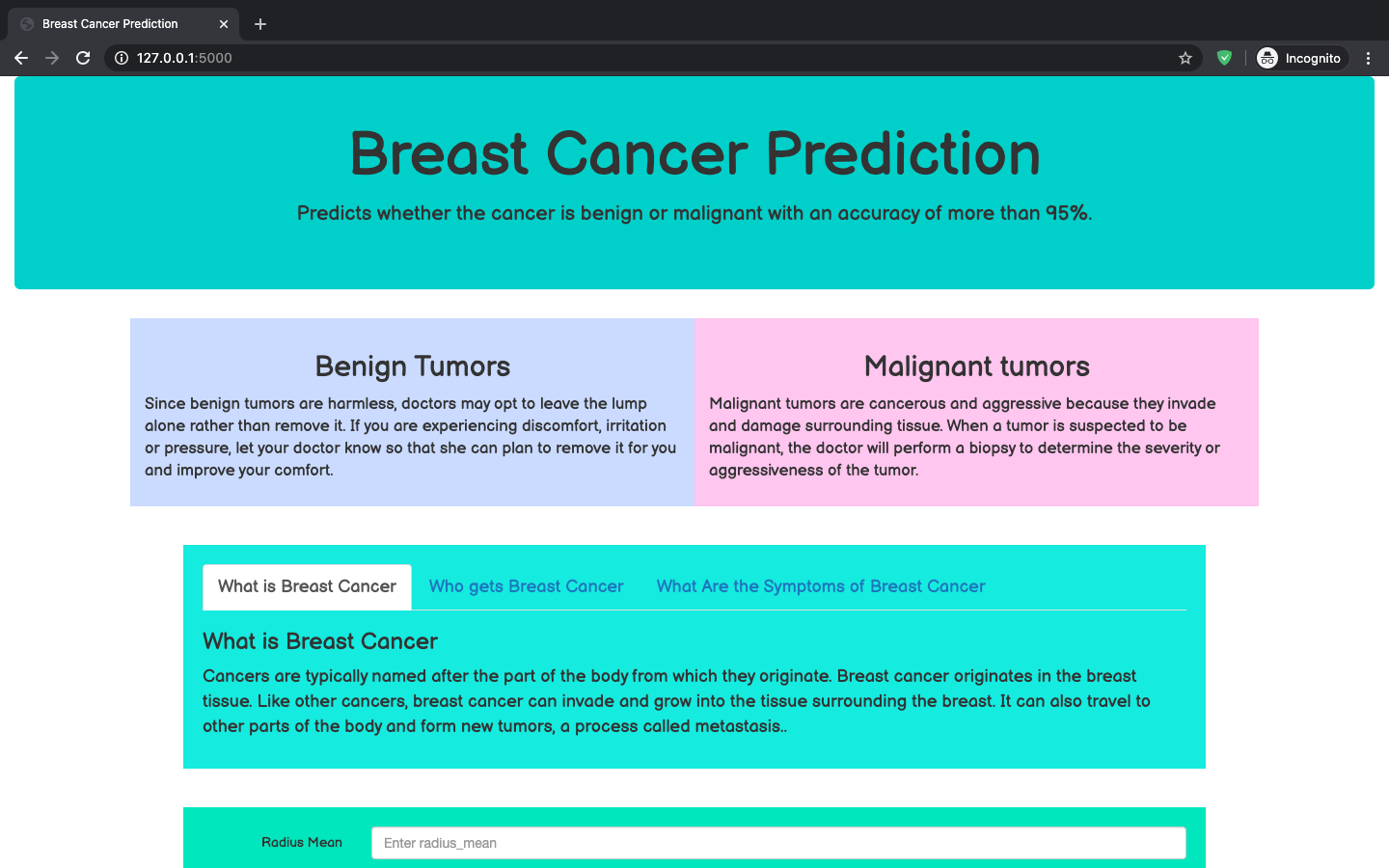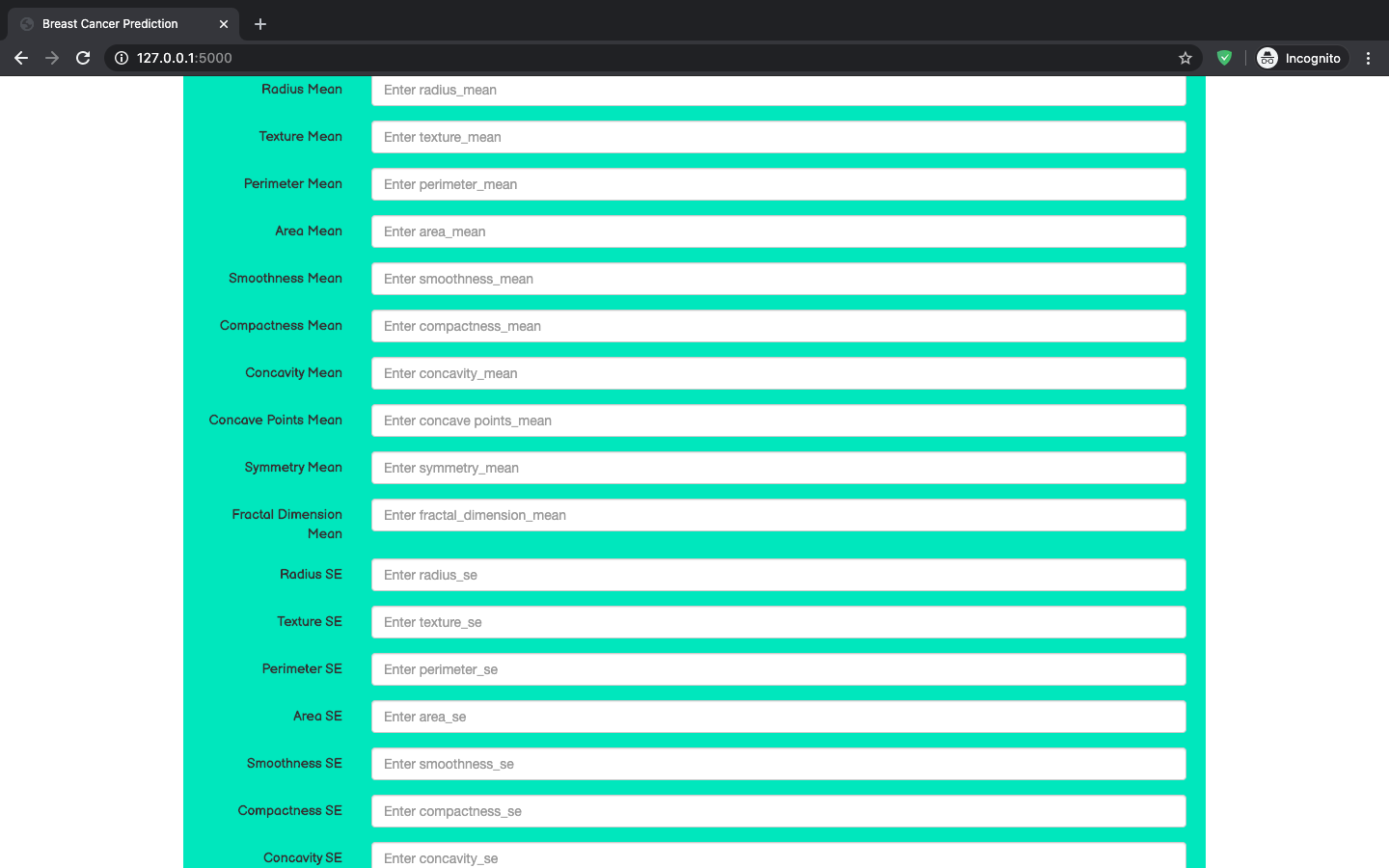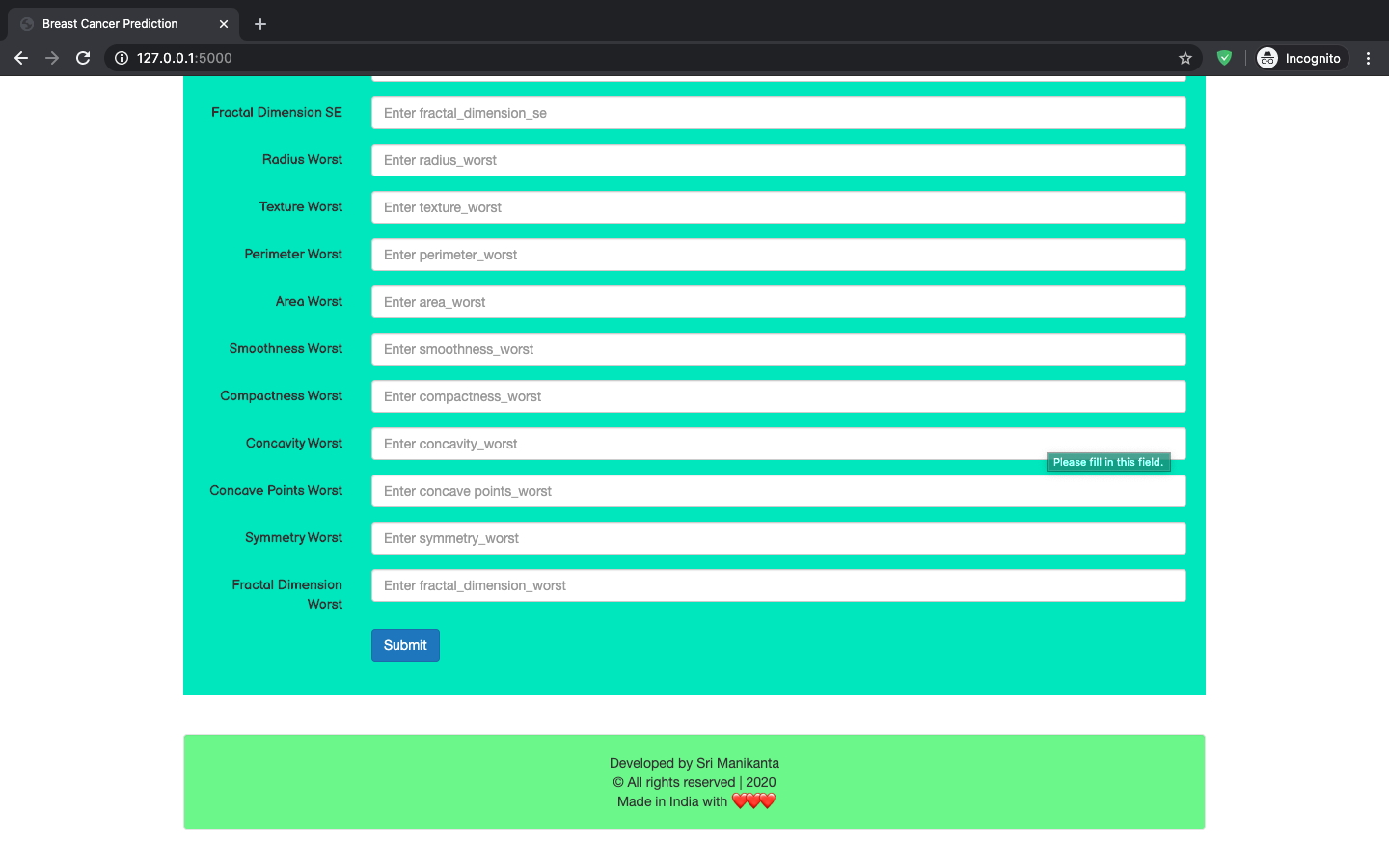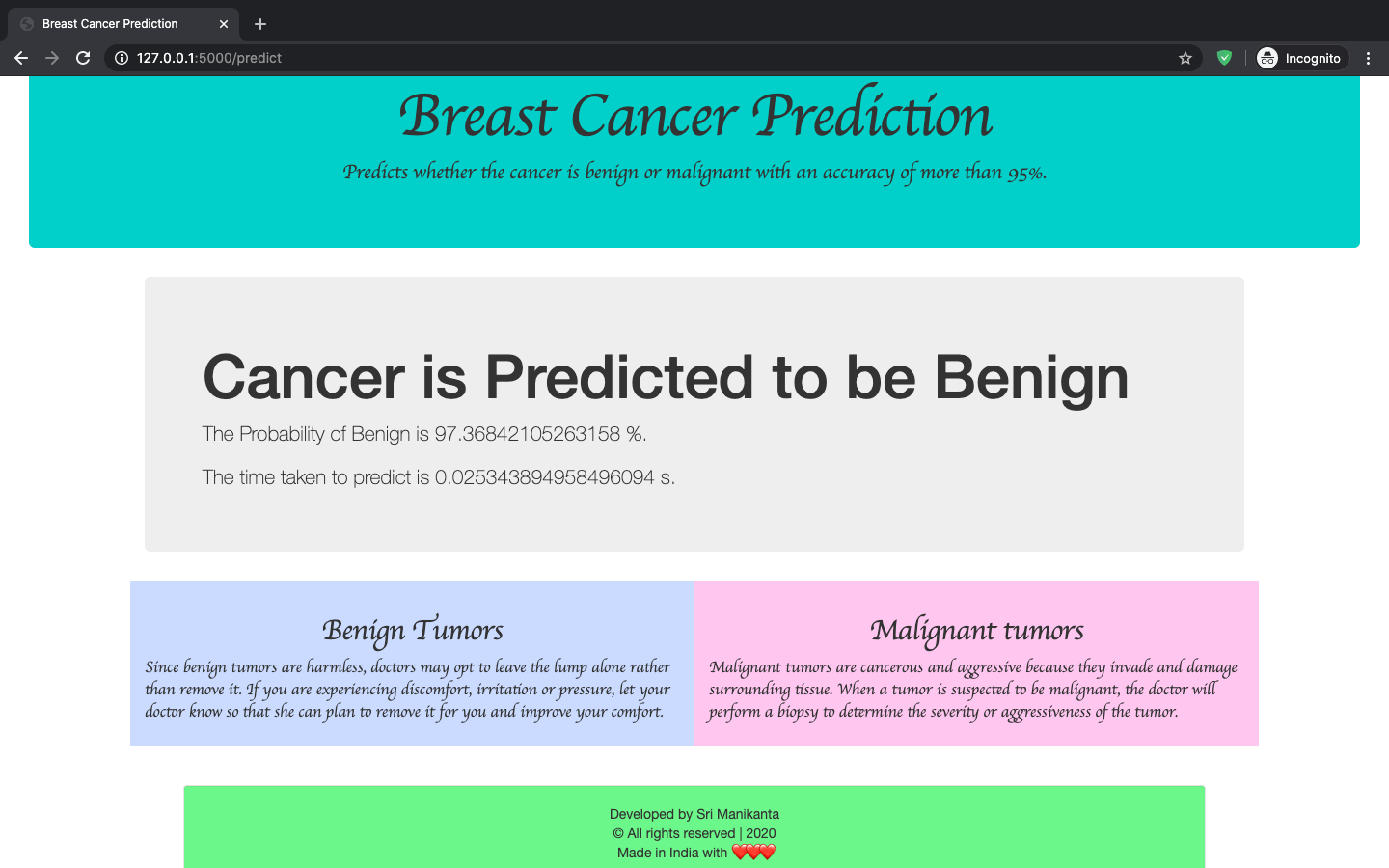Predicts whether the type of breast cancer is Malignant or Benign
Please follow the Code of Conduct: Code of Conduct
> To predict if a breast cancer is Malignant or Benign using Image Dataset as well as Numerical Data
Note: Kindly do not push any changes to Main or Master Branch. A New Branch named "New_Pipeline" is already created and push all the changes to this branch
👉 Repo Link : https://github.com/srimani-programmer/Breast-Cancer-Predictor/
Breast cancer is the most common type of cancer in women. When cancers are found early, they can often be cured. There are some devices that detect the breast cancer but many times they lead to false positives, which results is patients undergoing painful, expensive surgeries that were not even necessary. These type of cancers are called benign which do not require surgeries and we can reduce these unnecessary surgeries by using Machine Learning. I have taken the dataset of the previous breast cancer patients and train the model to predict whether the cancer is benign or malignant. These predictions will help doctors to do surgeries only when the cancer is malignant, thus reducing the unnecessary surgeries for woman.
For building the project I have used Wisconsin Breast cancer data which has 569 rows of which 357 are benign and 212 are malignant. The data is prepossessed and scaled. I have trained with Random forest Classifier gives best accuracy of 95.0%. To provide the easy to use interface to doctors I have developed a website that will take the data and display the output with accuracy and time taken to predict.
- Python: language
- NumPy: library for numerical calculations
- Pandas: library for data manipulation and analysis
- SkLearn: library which features various classification, regression and clustering algorithms
- Flask: microframework for building web applications using Python.
- First Clone the repository.
- Create the virtual environment for the project.
$ conda create -n myenv python=3.6- Install the required packages using requirements.txt inside the environemnt using pip.
$ pip install -r requirements.txt- run the app.py as
python app.py - Web Application will be hosted at
127.0.0.1:5000 - Enter the URL in the browser Application will be hosted.
- Enter the details of the tumor to detect the type of the cancer with more than 95% accuracy.
Star the repo by pressing the topmost-right button to start your wonderful journey.
NOTE: commands are to be executed on Linux, Mac, and Windows
You need to clone (download) it to local machine using
$ git clone https://github.com/Your_Username/Breast-Cancer-Predictor.gitThis makes a local copy of the repository in your machine.
Once you have cloned the `Breast-Cancer-Predictor' repository in Github, move to that folder first using change directory command on Linux, Mac, and Windows
# This will change directory to a folder Hacktoberfest_20
$ cd Breast-Cancer-PredictorMove to this folder for all other commands.
Run the following commands to see that your local copy has a reference to your forked remote repository in Github ![]()
$ git remote -v
origin https://github.com/Your_Username/Breast-Cancer-Predictor.git (fetch)
origin https://github.com/Your_Username/Breast-Cancer-Predictor.git (push)Now, let's add a reference to the original Breast-Cancer-Predictor repository using
$ git remote add upstream https://github.com/srimani-programmer/Breast-Cancer-Predictor.gitThis adds a new remote named upstream.
See the changes using
$ git remote -v
origin https://github.com/Your_Username/Breast-Cancer-Predictor.git (fetch)
origin https://github.com/Your_Username/Breast-Cancer-Predictor.git (push)
upstream https://github.com/Remote_Username/Breast-Cancer-Predictor.git (fetch)
upstream https://github.com/Remote_Username/Breast-Cancer-Predictor.git (push)In your case, you will see
$ git remote -V
origin https://github.com/Your_Username/Breast-Cancer-Predictor.git (fetch)
origin https://github.com/Your_Username/Breast-Cancer-Predictor.git (push)
upstream https://github.com/manan-bedi2908/Breast-Cancer-Predictor.git (fetch)
upstream https://github.com/manan-bedi2908/Breast-Cancer-Predictor.git (push)Always keep your local copy of the repository updated with the original repository. Before making any changes and/or in an appropriate interval, run the following commands carefully to update your local repository.
# Fetch all remote repositories and delete any deleted remote branches
$ git fetch --all --prune
# Switch to `New_Pipeline` branch
$ git checkout New_Pipeline
# Reset local `main` branch to match the `upstream` repository's `main` branch
$ git reset --hard upstream/main
# Push changes to your forked `Breast-Cancer-Predictor` repo
$ git push -u origin New_PipelineOnce you have completed these steps, you are ready to start contributing to the project and creating pull requests.
Whenever you are going to contribute. Please create a separate branch using command and keep your main branch clean (i.e. synced with remote branch).
# It will create a new branch with name Branch_Name and switch to branch Folder_Name
$ git checkout -b New_PipelineCreate a separate branch for contribution and try to use the same name of the branch as of folder.
To switch to the desired branch
# To switch from one folder to other
$ git checkout New_PipelineTo add the changes to the branch. Use
# To add all files to branch Folder_Name
$ git add .Type in a message relevant for the code reviewer using
# This message get associated with all files you have changed
$ git commit -m 'relevant message'Now, Push your awesome work to your remote repository using
# To push your work to your remote repository
$ git push -u origin New_Pipeline(Kindly push all the changes to the "New_Pipeline", not main branch)
Finally, go to your repository in the browser and click on compare and pull requests.
Then add a title and description to your pull request that explains your precious effort.
Home Page
Tumor Data form
Tumor Data form
Prediction Output
Made with contributors-img.








